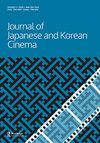韩国女权主义纪录片《家庭计划:父亲之家》(2001)和《两条线》(2011)中的女性自我建构
引用次数: 0
摘要
摘要本文特别关注女性电影人在韩国纪录片制作史上的强势地位,分析了两部女性主义民族志纪录片《家庭计划:父亲之家》(Paemili peurojekteu:abeojiui jip,Jo Yun-gyeong,2001)和《两条线》(Du gaeui-seon,Jimin,2011),强调这些个人纪录片如何为女权主义问题创造新的话语空间。这些电影体现了2000年代制作的韩国女权主义纪录片的两个最突出的特点:自传或民族志方法,以及在21世纪背景下对家庭制度的批判性重新审视。对这些电影的分析集中在女性叙事者/电影制作人的角色和纪录片制作中的表演性,以说明个人纪录片如何成为女性电影制作人审问当时最紧迫的女权主义/性别问题以及在制作过程中构建新的女性自我/主体性的有用策略。制作个人纪录片的行为本身可以被视为一个自我探索的过程,而制作个人纪录片所特有的表演性将这种行为确立为一种表演性话语。本文章由计算机程序翻译,如有差异,请以英文原文为准。
Construction of the female self in South Korean feminist documentaries Family Project: House of a Father (2001) and The Two Lines (2011)
ABSTRACT This essay pays particular attention to the strong presence of women filmmakers in the history of South Korean documentary filmmaking, analyzing two feminist autoethnographic documentaries, Family Project: House of a Father (Paemilli peurojekteu: abeojiui jip, Jo Yun-gyeong, 2001) and The Two Lines (Du gaeui seon, Jimin, 2011), to highlight how these personal documentaries create new discursive spaces for feminist issues. These films exemplify the two most prominent features of Korean feminist documentaries produced in the 2000s: autobiographical or autoethnographic approach and the critical reexamination of the family institution in the context of the twenty-first Century. The analysis of these films focuses on the role of the female narrator/the filmmaker and performativity in documentary filmmaking in order to illustrate how personal documentaries can be a useful strategy for women filmmakers to interrogate the most pressing feminist/gender issues of the time as well as to construct a new female self/subjectivity in the process of production. The act of making personal documentaries itself could be considered a process of self-exploration, and the performativity unique to making personal documentaries establishes such an act as a performative utterance.
求助全文
通过发布文献求助,成功后即可免费获取论文全文。
去求助
来源期刊

Journal of Japanese and Korean Cinema
Arts and Humanities-Visual Arts and Performing Arts
CiteScore
0.60
自引率
0.00%
发文量
16
期刊介绍:
Journal of Japanese and Korean Cinema is a fully refereed forum for the dissemination of scholarly work devoted to the cinemas of Japan and Korea and the interactions and relations between them. The increasingly transnational status of Japanese and Korean cinema underlines the need to deepen our understanding of this ever more globalized film-making region. Journal of Japanese and Korean Cinema is a peer-reviewed journal. The peer review process is double blind. Detailed Instructions for Authors can be found here.
 求助内容:
求助内容: 应助结果提醒方式:
应助结果提醒方式:


